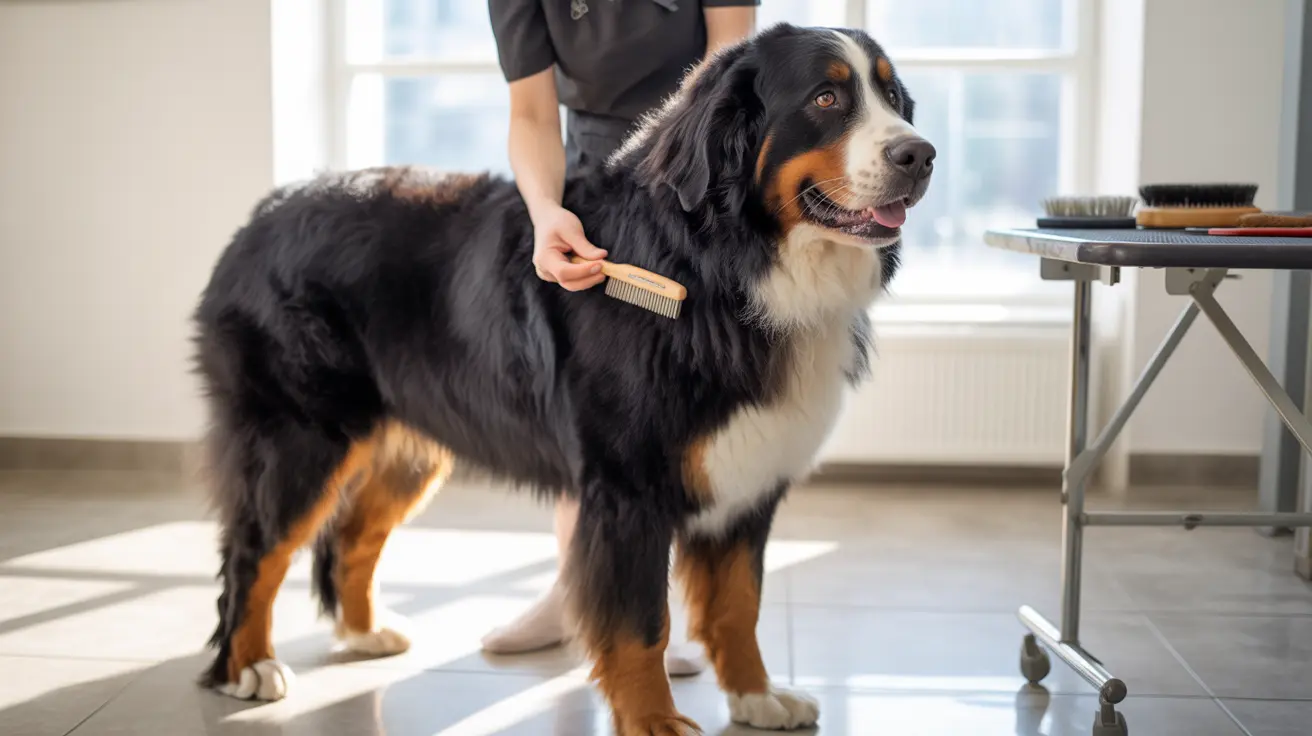Bernedoodles, the charming crossbreed between Bernese Mountain Dogs and Poodles, have captured the hearts of dog lovers worldwide with their exceptional blend of intelligence, affection, and adaptability. These versatile companions excel in various living environments, from urban apartments to spacious country homes, making them an increasingly popular choice for families and individuals alike.
What sets Bernedoodles apart is their typically low-shedding coat, a characteristic particularly appealing to allergy-sensitive households or those seeking a cleaner living space. Their remarkable ability to combine the gentle nature of the Bernese Mountain Dog with the intelligence of the Poodle creates a unique companion that fits seamlessly into diverse lifestyle patterns.
Understanding proper Bernedoodle care is essential for ensuring these beloved pets live long, healthy, and fulfilled lives. This comprehensive guide covers everything from health considerations to grooming requirements, helping you provide the best possible care for your furry friend.
Understanding Bernedoodle Health
While Bernedoodles are generally healthy dogs, being aware of potential health concerns is crucial for proactive care and early intervention when necessary. Regular veterinary check-ups, maintaining an up-to-date vaccination record, and providing preventative treatments for parasites form the cornerstone of maintaining optimal Bernedoodle health. Additionally, monitoring your pet for any signs of discomfort or behavioral changes helps in identifying health problems early for timely treatment.
Common Health Concerns
- Hip and Elbow Dysplasia: These inherited joint conditions require careful monitoring and weight management, as excess weight can worsen joint issues. Owners should ensure their Bernedoodle receives appropriate exercise and avoid high-impact activities during puppyhood to prevent complications.
- Progressive Retinal Atrophy (PRA): A degenerative eye condition that may affect vision over time. Regular veterinary eye exams are important for early detection, allowing owners to manage lifestyle adjustments if vision deteriorates.
- Allergies: Despite their hypoallergenic reputation, Bernedoodles can develop food or environmental sensitivities. Watch for signs such as itching, redness, or digestive problems and consult your veterinarian for proper diagnosis and management.
- Gastric Dilatation-Volvulus (GDV): A serious, potentially life-threatening condition more common in larger Bernedoodles. Preventive measures include feeding smaller, more frequent meals and avoiding vigorous activity around mealtime. Familiarize yourself with the symptoms—such as abdominal bloating and distress—and seek immediate veterinary attention if suspected.
- Von Willebrand's Disease: An inherited blood clotting disorder requiring careful management. Ensure your veterinarian is aware if your Bernedoodle has this condition, especially before surgeries or dental work, to prevent complications.
Nutrition and Feeding Guidelines
Proper Bernedoodle nutrition forms the foundation of their overall health and vitality. Feeding a balanced, high-quality diet tailored to your dog's age, size, and activity level promotes optimal growth and development. Fresh water should always be accessible, and treats should be given in moderation to avoid unnecessary weight gain.
Age-Specific Feeding Requirements
- Puppies: Feed 3-4 small meals daily using high-quality puppy food formulated specifically for large-breed puppies if your Bernedoodle will be a larger adult. Monitor their weight and adjust portions as they grow to maintain optimal condition.
- Adults: Provide 2 balanced meals per day with attention to portion control. Choose a premium adult dog food and adjust amounts based on your Bernedoodle’s activity level and metabolism. Avoid feeding table scraps, as these can contribute to dietary imbalances.
- Seniors: As your Bernedoodle ages, their metabolism will slow, and they may become less active. Transition to a senior-formulated diet with adjusted portions, and prioritize nutrients that support joint health and maintain a healthy weight.
Regularly consult with your veterinarian to ensure your feeding schedule aligns with your dog's unique nutritional requirements.
Professional Training Techniques
Bernedoodle training success relies on consistent, positive approaches that harness their natural intelligence and eagerness to please. Engaging in early socialization and structured training sessions lays the groundwork for a confident and obedient adult dog. Setting clear boundaries and expectations, while using patience, helps establish a trusting relationship between you and your Bernedoodle.
Effective Training Methods
- Positive Reinforcement: Reward-based training using treats, praise, or toys whenever your Bernedoodle performs desired behaviors. This method encourages a proactive attitude toward learning and builds a strong bond between owner and pet.
- Clicker Training: Utilizing a clicker allows for precise timing in marking the exact moment your dog performs the correct behavior. Pairing the click with a reward helps reinforce training outcomes and improves communication.
- Early Socialization: Expose your Bernedoodle to various environments, people, other animals, and different situations from a young age. Proper socialization reduces anxiety and helps prevent behavioral problems later in life.
- Consistency: Maintain regular training sessions using clear, concise commands. Consistency in cues, expectations, and routines will make it easier for your Bernedoodle to grasp and retain new skills.
Remember that patience and encouragement go a long way. If you encounter challenges, consider enlisting the help of a professional dog trainer familiar with Bernedoodles or doodle breeds.
Essential Grooming Practices
Regular Bernedoodle grooming maintains both their appearance and overall health. Their unique coats, which can range from wavy to curly, require varying degrees of care. Establishing a grooming routine early helps prevent matting, reduces shedding, and keeps your dog comfortable and looking their best.
Grooming Schedule
- Daily: A brief brush-through is recommended each day to prevent tangles and mats, particularly for Bernedoodles with longer or curlier coats.
- Weekly: In addition to brushing, clean your Bernedoodle’s ears to prevent the buildup of wax and debris, which can lead to infections.
- Monthly: Give your Bernedoodle a bath using a dog-specific shampoo, and trim their nails to prevent overgrowth and discomfort.
- Every 6-8 weeks: Schedule a professional grooming session for a thorough trim or haircut, especially if you prefer to keep your dog’s coat at a manageable length.
Don’t forget to check teeth and gums regularly and establish a dental hygiene routine to maintain oral health.
Exercise and Activity Requirements
Meeting your Bernedoodle's exercise needs is crucial for their physical and mental well-being. Regular activity helps to manage weight, provides mental stimulation, and curbs the development of behavioral issues. A well-exercised Bernedoodle is typically calmer and more content at home, making life more harmonious for the entire family.
Daily Activity Guidelines
- Morning: Start the day with a brisk 30-minute walk or an energetic play session to expend early energy and encourage good behavior.
- Afternoon: Engage your Bernedoodle with interactive games such as fetch, agility exercises, or a training session. Mental challenges are just as important as physical ones for this intelligent breed.
- Evening: A moderate exercise routine, such as a leisurely walk or calm playtime, helps wind down the day and maintains your dog’s routine.
Adapt exercise levels according to age, health, and weather conditions, and always provide fresh water after physical activity.
Frequently Asked Questions
- What is a Bernedoodle? A Bernedoodle is a cross between a Bernese Mountain Dog and a Poodle, known for being affectionate, intelligent, and adaptable companions.
- How often should I groom my Bernedoodle? Brush several times a week to maintain their coat and trim or groom every 6–12 weeks, depending on coat length and texture.
- Do Bernedoodles shed a lot? Bernedoodles are low-shedding, especially those with curlier coats, making them suitable for many allergy-sensitive households.
- What health issues are common in Bernedoodles? Common concerns include hip dysplasia, inherited eye conditions, allergies, and certain blood disorders; regular check-ups aid in early detection and management.
- How much exercise does a Bernedoodle need? Bernedoodles require daily moderate exercise, such as walks and playtime, to maintain their health and happiness.
- What should I feed my Bernedoodle? Feed high-quality dog food appropriate for their size, age, and activity level; consult your vet for specific recommendations.
- Are Bernedoodles easy to train? Thanks to their intelligence and desire to please, Bernedoodles are typically easy to train when positive reinforcement methods are used.
- How do I prevent matting in my Bernedoodle's coat? Regular brushing, especially for longer coats, and occasional trims prevent mats and tangles, keeping the coat healthy.
- At what age should I start grooming a Bernedoodle puppy? Start grooming routines as early as 8 weeks old to build comfort and establish good lifelong habits.
- Do Bernedoodles need their ears cleaned regularly? Yes, check and clean their ears weekly to prevent wax buildup and reduce the risk of ear infections.
Bringing a Bernedoodle into your life represents a commitment to providing comprehensive care that addresses their physical, mental, and emotional needs. With proper attention to health, nutrition, training, and grooming, your Bernedoodle will thrive as a beloved family member, offering years of joy, companionship, and unconditional love.






